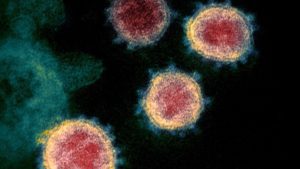 Another Covid variant has come to vacation in Hawaiʻi. Hopefully it does not plan to be a permanent resident.
Another Covid variant has come to vacation in Hawaiʻi. Hopefully it does not plan to be a permanent resident.
The Department of Health State Laboratories Division (SLD) has detected a new variant of concern. This new strain has the technical name B.1.351 and is sometimes referred to as the South African variant. It was found in an O‘ahu resident with no travel history.
“This is concerning because B.1.351 has a mutation that makes it more transmissible from one person to another, and a separate mutation that might make it less responsive to the antibodies we form when we have COVID or get vaccinated,” said SLD Director Dr. Edward Desmond.
The mutation that increases transmissibility is called N501Y. The mutation that may reduce effectiveness of antibodies is called E484K.
The N501Y and E484K mutations had previously been seen in Hawai‘i, but this is the first time both mutations have been found together in one virus.
- This variant has multiple mutations in the spike protein, including K417N, E484K, N501Y. Unlike the B.1.1.7 lineage detected in the UK, this variant does not contain the deletion at 69/70.
- This variant was first identified in Nelson Mandela Bay, South Africa, in samples dating back to the beginning of October 2020, and cases have since been detected outside of South Africa, including the United States
- The variant also was identified in Zambia in late December 2020, at which time it appeared to be the predominant variant in the country.
- Currently there is no evidence to suggest that this variant has any impact on disease severity.
- There is some evidence to indicate that one of the spike protein mutations, E484K, may affect neutralization by some polyclonal and monoclonal antibodies.
“While theoretical concerns have been raised about whether vaccination will be effective against new variant strains, the real-world data so far are reassuring” said Acting State Epidemiologist Dr. Sarah Kemble. “A study in South Africa showed the Johnson & Johnson vaccine was effective in preventing serious disease requiring hospitalization and in preventing death even where B.1.351 was the predominant strain.”
Both the Moderna and Pfizer-BioNTech vaccines finished clinical trials before the emergence of B.1.351 and other variants of concern, so there are no clinical data for how they defend against the newer iterations of the virus. But in their trials, both were shown to be greater than 90% efficacious at preventing symptomatic Covid-19, so some experts have argued that even if they lose some of their oomph against particular variants, they have enough cushion to remain highly protective. But the drops in efficacy in the Novavax and J&J trials against the variant have led some experts to believe that the Moderna and Pfizer-BioNTech vaccines would show similar declines if they were tested against B.1.351 in clinical settings.
Two new cases of the B.1.1.7 variant, also known as the U.K. variant, also have also been found, for a total of eight B.1.1.7 variant cases detected in the state to date. This variant, first detected in Hawai‘i in early February, has the N501Y transmissibility mutation, but not the E484K mutation. The most recent cases of B.1.1.7 involve two O‘ahu residents, one who traveled to the mainland United States and a household contact of that individual.
Investigation into cases of recently detected variants is ongoing. Close contacts have been quarantined.
“Research shows community mitigation measures are effective in reducing the risk of transmission of even the most aggressive variants,” said State Health Director Dr. Elizabeth Char. “This means wearing masks, maintaining physical distance and washing hands is more important than ever. The effectiveness of vaccines in preventing serious illness or death means we should get vaccinated as soon as it is our turn.”
The SLD continues to perform genomic sequencing weekly on COVID samples from across the state in order to detect variant strains including strains of concern. This systemic search for variant strains is accomplished with the collaboration of private sector laboratories, to whom the SLD is grateful.



